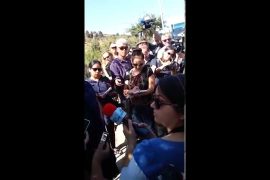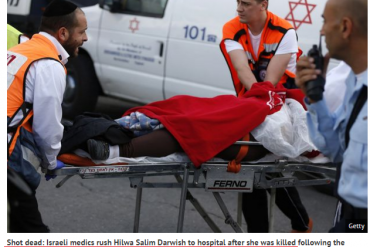h/t: JK
On December 30th 2012 BBC Radio 4 broadcast an hour-long programme entitled “News Review of the Year”, presented by Paddy O’Connell. The programme can be heard here for a limited period of time and readers in the UK can also find it on iPlayer.
Among the “defining events” chosen by the programme’s producer was the mid-November conflict between Hamas and Israel.
Beginning at 46:33 one hears the presenter start straight off with the theme of moral equivalence as he says: [emphasis added]
“These rockets were recorded being fired from Gaza towards targets in Israel. The two sides have been blaming each other for an escalation that reached new heights after Israel assassinated a Hamas officer they blamed for planning the strikes.”
Once again the BBC is promoting the erroneous notion that the escalation began with the death of Ahmed Jabari, negating the importance of the hundreds of rocket attacks which preceded that event.
Next comes a short (42 seconds) recording of a BBC report from Ashkelon which – importantly as we will see later on – makes do with describing the effects of terrorist rocket fire from Gaza in terms of “a gaping hole in the roof”.
After that, it is over to Gaza for a 34 second-long recording of Jon Donnison describing a “massive [Israeli] air strike”.
At 48:09 O’Connell is back, casting doubts upon Hamas’ use of the civilian population in Gaza as human shields, even though that was amply documented – sometimes inadvertently – by the BBC’s own reporters in Gaza at the time:
“Israel said it regretted all civilian casualties at home and in Gaza and accused Hamas of hiding weapons amid people’s houses. Jon Donnison returned to ‘From Our Own Correspondent’ to recount what lay behind one civilian death in Gaza. You may well find what follows distressing”.
What follows is an abridged version of Donnison’s November 24th broadcast on ‘From Our Own Correspondent” which lasts two minutes and a half.
Once again, a stage is given to Donnison’s explicit war pornography which gives graphic descriptions of the dead child. Once again, the unsubstantiated claim that the “Israeli military had bombed his [the child’s father’s] house” is propagated. Once again, Donnison’s promotion of false civilian casualty figures is aired to millions and once again Donnison’s accusation of inflated casualty figures in Israel is allowed to stand.
It is not surprising that the BBC has elected to resurrect Donnison’s report yet again after having invested very heavily in its promotion around the time of its broadcast and ever since. The piece is still available on the front page of the ‘Magazine’ section of the BBC News website.
Two days after Donnison’s programme was first aired on November 24th, additional aspects to the story came to light. The BBC has so far failed to clarify why, on November 26th, one of its film crews was present at the funeral of the brother of the baby’s father who was injured in the same incident and was buried wrapped in a Hamas flag. The BBC has also failed to address the subject of the highly problematic interview given by its employee Jihad Masharawi at that funeral to Hamas’ Al Aqsa TV.
Instead, the BBC continues to entrench a version of the recent conflict which – like its reporting at the time – is imbalanced, inaccurate and partial. Forty two seconds of coverage of rocket attacks in Israel relate only to damage to property. More than four times that amount of total coverage from Gaza (3 minutes 4 seconds) focuses on blaming Israel for the death of a baby whilst airbrushing out any context and refusing to address the unclarified aspects of the story.
What impression does this Radio 4 broadcast give its audiences? The answer to that is very clear. As far as the BBC is concerned, the recent conflict (like those in the past and – probably – those in the future) can be boiled down to annoying holes in the roof in Israel and tragic dead babies in Gaza.
The BBC’s dogged promotion of the Omar Masharawi story – and its failure to examine the real circumstances behind it – is indicative of a journalistic culture which seeks to advance a specific narrative by defining a narrow public perceptions of events, rather than reporting the news. Such a culture cannot fail to further compromise the BBC’s already severely battered reputation.







